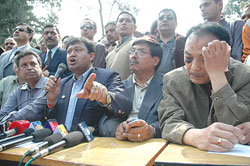|
|
| AN EYE FOR AN EYE: In March this year, entrepreneurs called a banda to protest the beating by Maoists of Hari Shrestha, owner of Woodlands Hotel (far right) |
It is probably because Nepal's political parties used the labour movement to do politics that the unions have not been able to rise above politics. That is why instead of working for the rights of the workers and industrialisation, the unions are just political pawns of their mother parties. Worse, the unions have been used to disturb industrial security which has affected not just industrial productivity but in the long term the nation's economy. The environment today is worse than even during the conflict years. Proof is in the number of companies, even multinationals, that have quit after the peace process. Not only is this a waste of investment, but it also ruins the lives of workers and undermines national revenue. The interventions by the labour unions are not in the interest of the labour force.
In most industrialised countries labour unions represent the interests of workers and the industries, not of political parties. In Nepal, the unions haven't spared the essential services sector, which in many countries are out of bounds. It is clear that Nepal's labour movement is so politicised that it is not in the interest of the citizens and the nation.
The latest target of the unions is the banking sector, where in the name of labour rights there is an increased risk of anarchy. In many of these institutions, union representatives use party pressure to get jobs just to collect their paychecks and sow disorder. The most negative effect of this is on fellow-workers in those companies.
This can't go on. If it does, the industries will just close down and everyone will be out of their jobs. It is important for the unions to remember that if there are no industries, there will be no workers, and no unions either. For this, unions should be represented by workers and not by party cadres. To save what is left of the industrial and services sector, there is an urgent need to redefine and depoliticise the labour movement. Business as usual will mean no business in the future.



